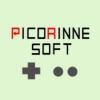🎤 Interview with RYO of Picorinne Soft
2023年 9月 24日
We were honored to be able to speak with RYO of Picorinne Soft about making arcade-style shooting games like the INFINOS Series!
English (Translated)
Translated by Renkon
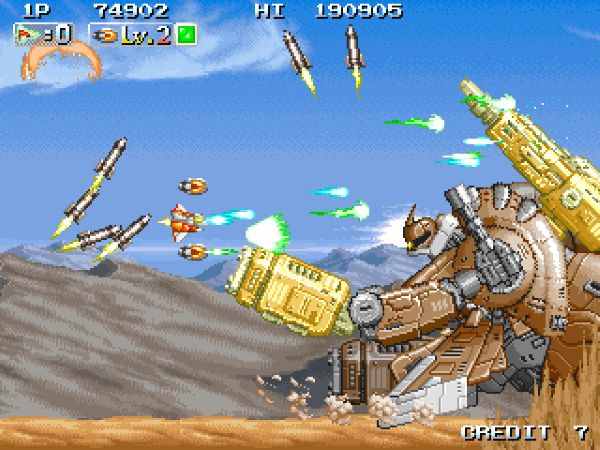
# Please tell us a little bit about yourself.
I am RYO of Picorinne Soft. I mostly make shooting games. Right now, I’m working with my older brother SATTO to make an RPG.
# How did you get started making games?
When I was a kid, I had a program called Shooting Game Maker 95 at home, and I used that to make simple games. At the time, it was difficult and I didn’t understand it well, but it laid the groundwork for my future game development. After that, I forgot about it and didn’t make games for a while. I happened to buy a copy of Gradius II (Famicom) at a second-hand shop, and I was surprised by how good it was, which led me to develop an interest in side-scrolling shooters from the '80s and '90s. I think I was a junior high school student at the time, around 2004.
From there, I got into series like Gradius, R-TYPE, and Darius, but as time passed, side-scrolling shooting games became a niche genre. There stopped being new releases, and instead it was just old games being re-released. For fans of those kinds of games, it was a really lonely time.
Later, when I was on holiday during my university days, I was struck with the memory of making video games. I thought that if there were no new games coming out, I should make one myself. That’s when I started making side-scrolling shooters.
# Can you tell us about some of your favorite games and genres?
I would have to say my absolute favorite game is Shiren the Wanderer (Super Famicom). I make shooting games, so when it comes to those, I like Gradius II (Famicom) and R-TYPE II (arcade). I prefer horizontal scrolling over vertical scrolling shooters.
# Please tell us about the INFINOS series! What are some key differences among all the titles?
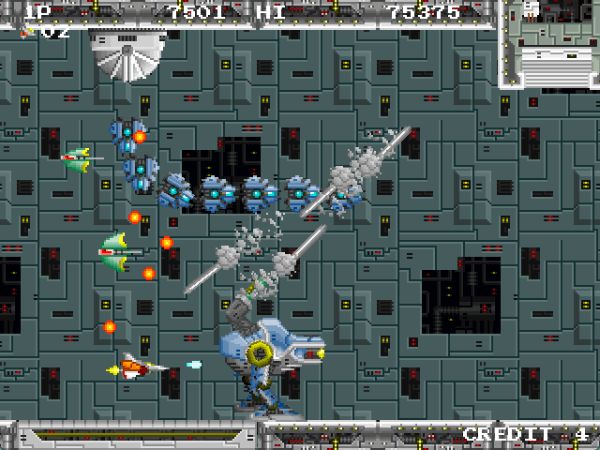
The first INFINOS is a side-scrolling terrain shooter modeled after games from the mid- to late-'80s. The two Bits that can be upgraded with items, one to increase speed and one to strengthen your barrier, was carried over to later games. It was my first game so it is quite simple, but it acts as the foundation for the series.
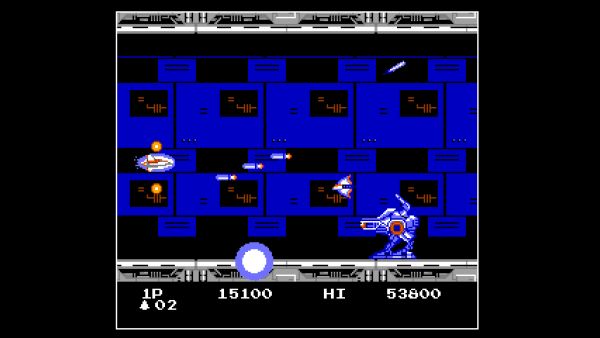
The concept behind the second game, INFINOS 0, was if the original INFINOS had been an arcade game that was then ported to the Famicom. Back then, arcade games were sometimes brought over to the Famicom, but because of differences in performance due to the hardware, they were often not perfect ports. To make up for it and to take advantage of the Famicom’s strengths, games often added original elements and devised new ways of pushing the limitations of the hardware, thus making them just as interesting as the original arcade versions. With INFINOS 0, I aimed to convey that feeling of, “This is fun in its own right.”
The third game, INFINOS 2, was the first paid game we released, and has many more stages and mode selections, and is overall a much larger game. The story, game system, and content are greatly connected with the following game, INFINOS GAIDEN.
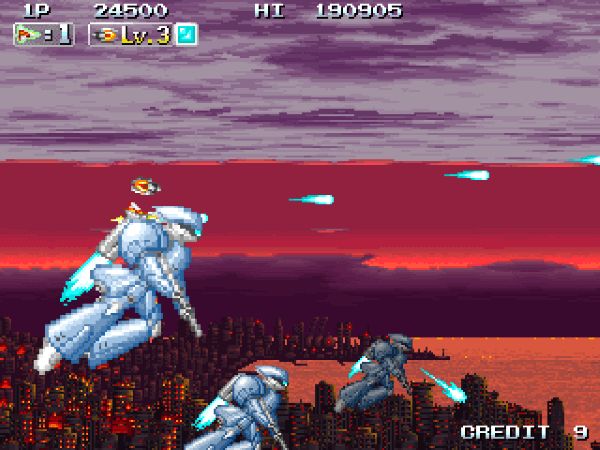
The fourth game, INFINOS GAIDEN, breaks away from the mid- to late-'80s style of the previous games and instead draws inspiration from the early '90s. The fundamental system is still there, but the graphics have been completely revamped, and we asked composer Hyakutaro Tsukumo to handle the music. I think because of this, INFINOS GAIDEN feels hugely different from the previous games. But even though we added many new elements, we hope that people who have played the previous games can also enjoy it.
# Can you tell us about the process of making the INFINOS games? Was it different from the way you approach development on your other games?
My method of making games hasn’t changed much since I started. First I think about the overall structure of the stage, and in my case I start by drawing the background art. After placing the background and scrolling over it, I create and place enemy characters while thinking, “What kind of enemy would be interesting to encounter at this point?” Since I basically work alone, it’s a matter of turning the image I have in my head into reality. For INFINOS GAIDEN, I asked Hyakutaro Tsukumo to do the BGM, so once the stages were completed, I sent him a test version and asked him to create music to go with each stage.
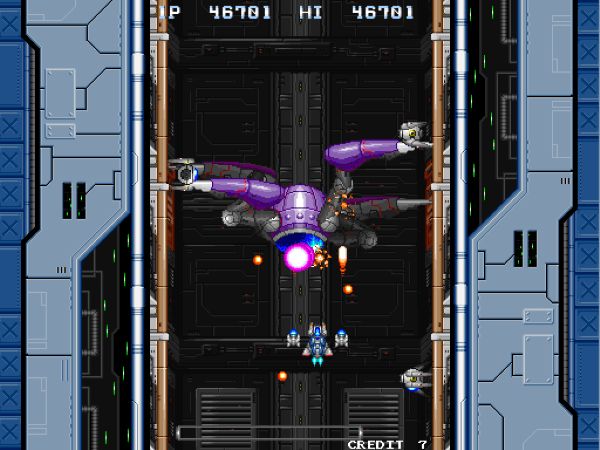
# Can you tell us a bit about Battle Crust? It feels like it inherited a lot of DNA from INFINOS, such as the weapon-swapping system, but is there any connection within the story? What were some differences between making a vertical shooter instead of a horizontal one?
The story is totally independent from INFINOS. I like shooting games, but I am really bad at vertical scrolling games, and I’ve never cleared any. With Battle Crust, I aimed to make a shooting game that would be easy to play for someone like me, who loves horizontal shooters. I created Battle Crust using basically the same method as the INFINOS series. Unlike the INFINOS series, there is no stage terrain, and since I wasn’t used to that, I had a hard time.
# What was your greatest influence when making the INFINOS games?
Up until INFINOS 2, the games were heavily influenced by famous side-scrolling shooters such as R-TYPE and Gradius. I wanted to dramatically change the look of INFINOS GAIDEN, so we gave it the atmosphere of a 2D action game. In particular, the Mega Man X series greatly influenced its design.
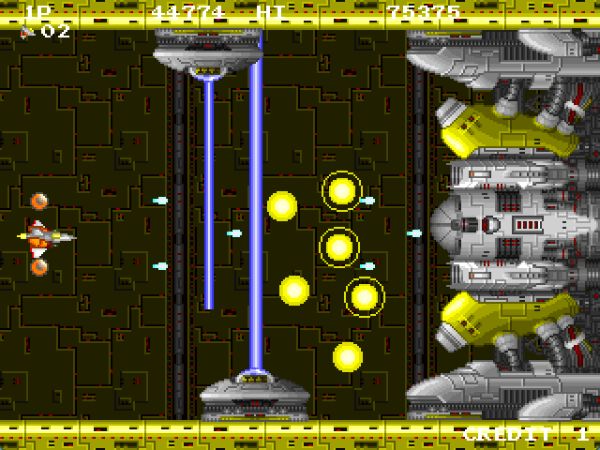
# What was the most challenging part of making the INFINOS games?
When making the first games, because I was not yet used to game development, I was particular about making detailed backgrounds and bosses. With pixel art, bigger sprites mean more work, which can be really tough. But if you want to recreate the feeling of arcade shooting games from back then, enormous bosses and detailed mechanical fortresses are essential. When I first started, I think it took anywhere from several days to a week to create a single sprite of a big boss.
# Can you tell us about the circumstances around the release of INFINOS EXA in arcades? What are the differences between GAIDEN and EXA?
After the release of INFINOS GAIDEN, I was contacted by Eric from exA-Arcadia. I had never even thought to release an arcade version, but I decided to take the plunge and give it a try. In addition to the Original Mode which is the same as GAIDEN, there is a special EXA Mode. In this mode, the enemies and bosses are stronger, but the player’s ship has also been significantly powered up, making the gameplay simple yet exciting. Players can choose from three types of ships, and I think they will enjoy the different feel from GAIDEN.
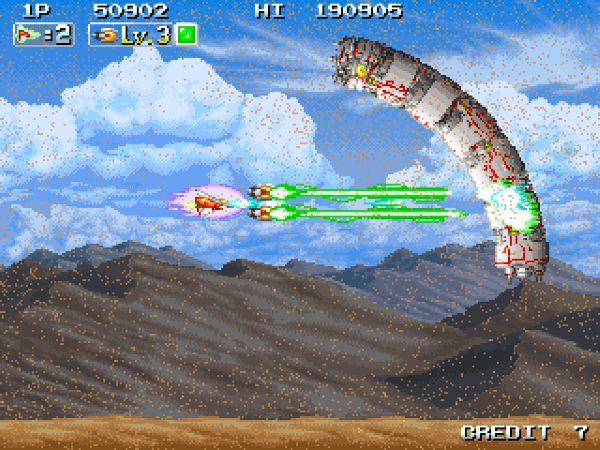
# Is there anything in the INFINOS series to which you want to draw the player’s attention?
With INFINOS GAIDEN, we were especially particular about the presentation of the stages. On top of having clear stage directions, we wanted you to really get a feel for the atmosphere, such as the mountains, the sky, and the clouds, all through the backgrounds. This has nothing to do with the gameplay, but I hope you enjoy getting immersed in this world.
# Do you have any plans to work on another INFINOS game?
Right now it’s impossible, but if I can find the time, I would like to make another one.
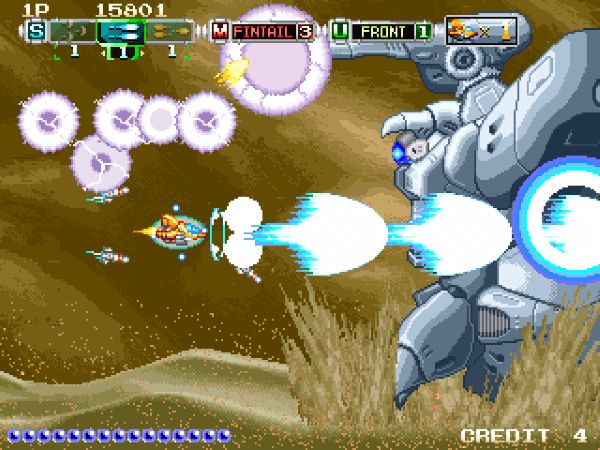
# Can you tell us a bit about Andro Dunos II? What are some of the differences between that and the INFINOS series, as well as the original Andro Dunos?
Andro Dunos II is the sequel to Andro Dunos, released by Visco Corporation on Neo Geo. The current IP holder is JoshProd (ed. note: now operating as PixelHeart) who requested that Picorinne Soft be in charge of production on the sequel. While some parts of the original system carried over, we added new elements to the game such as hyper shots and leveling bonuses on the stage clear screens. The original Andro Dunos came out in 1992, so we tried to keep the atmosphere of the sequel to look like it released only a few years after that, but the difficulty and game systems have more modern sensibilities. We thought that if we kept the difficulty settings from back then, players nowadays would not be amenable. The difficulty in Andro Dunos II was well-received, so I think the feedback we received from the INFINOS series was effective here.
# If you were offered to make another shooting game with an established IP, would you accept?
I think Andro Dunos II was a good experience, but to tell the truth, it put me under a ton of pressure. If I have the time to make games for other IPs, I’d rather spend it making a new INFINOS game.
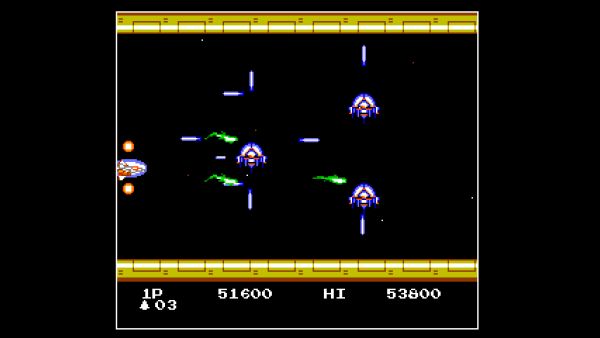
# I understand that Picorinne Soft is made up of RYO, who makes shooting games, and SATTO, who makes monster-catching RPGs. How do you help each other out while working on your own projects?
Basically, we don’t interfere with each other’s work, we give advice when production stalls out for one of us, and we playtest our games when they are completed.
Q: Do you think this is good? A: Yeah, it’s good.
Since we are brothers, this is how we interact.
# Between the two of you, who is better at video games?
Generally, SATTO is better.
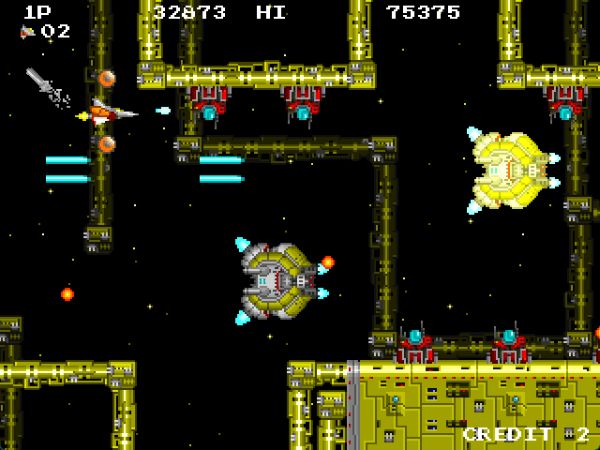
# Do you have any indie games that you’d like to shout out? What do you like about them?
There is this fun game I like called Blazing Beaks. The birds that you can play as are funny and cute, and the game itself is solid, especially the boss battles.
# Can you tell us about anything you are currently working on?
Currently, I’m helping to make Disc Creatures WORLD, the sequel to SATTO’s Disc Creatures. This is the first time we brothers will make a game together.
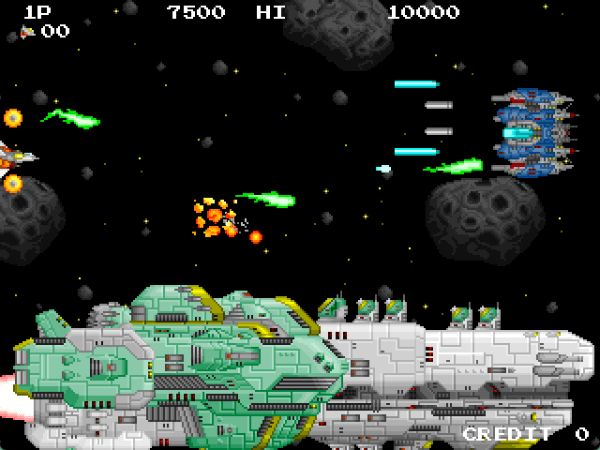
# Do you have any messages for your players?
Picorinne Soft is celebrating its 10th anniversary this year. I never thought I would still be doing this for so long, and I am only able to continue thanks to the support of so many people. We are doing our best to bring you Disc Creatures WORLD, so please look forward to that as well.
# Thank you for sharing your thoughts with us!
日本語

# 自己紹介してください。
ピコリンネソフトのRYOと申します。主にSTGを制作しています。現在は兄のSATTOと協力してRPGを制作しています。
# ゲーム作りを始めたきっかけはなんですか。
子供の頃に「シューティングツクール95」というゲーム制作ソフトが家にあり、それで簡単なゲームを作ったことがありました。その当時は難しくて良くわかっていませんでしたが、ゲーム制作の下地にはなったと思います。その後ゲーム制作はしばらく忘れてしまっていましたが、偶然中古ショップで「グラディウスⅡ」(FC)を購入して、その出来の良さに驚き、それがきっかけで80~90年代の横スクロールシューティングに傾向するようになりました。当時中学生で2004年くらいだったと思います。
それから「グラディウス」、「R-TYPE」、「ダライアス」といったシリーズに触れるようになりましたが、時間が経つにつれ横スクロールシューティング自体がニッチなジャンルになりつつあり、新作が出ない、旧作を繰り返し遊ぶ状況に寂しさも感じていました。
その後大学時代の長期休み中にふとゲーム制作のことを思い出し、新作が出ないなら自分で作ろうと考え、そこから横スクロールシューティングの制作が始まりました。
# もしよろしければ、ご本人にとって一番好きなゲームや好きなジャンルをご紹介お願いします。
最も好きなゲームで言うと「風来のシレン」(SFC)です。シューティング作者なのでシューティングに限って言えば「グラディウスⅡ」(FC)と「R-TYPEⅡ」(AC)が好みです。縦スクロールより横スクロールのシューティング派です。
# 「INFINOSシリーズ」についてご紹介お願いします。全部のタイトルのそれぞれの違いにも触れていただくとありがたいです。

初代「INFINOS」は80年代中~後期あたりをイメージして制作した地形横スクロールシューティングです。アイテムで強化される2つのビット、スピードアップ、バリアはその後の作品にも受け継がれています。初めての作品ということもあり内容的にはかなりシンプルですが、シリーズの基盤になっていると思います。

2作目「INFINOS 0」はアーケード風に作った「INFINOS」をファミコンに移植した場合、というコンセプトで制作しました。当時はアーケードゲームがファミコンに移植されることがありましたが、ハードの性能差があるため完全な移植ではありませんでした。その分ファミコンの良さを活かし、オリジナル要素や工夫が施され元のアーケード版にも劣らない面白い作品がありました。その「これはこれで面白い」という感覚を目指したのが「INFINOS 0」です。
3作目「INFINOS 2」は初めての有料作品ということもあり、ステージ数やモード選択で全体的にボリュームを大きくした作品です。ストーリー、システム、ゲーム内容はその後の「INFINOS外伝」にも大きく繋がっています。

4作目「INFINOS外伝」は今までの80年代中~後期の作風に対し90年代初期をイメージした作品です。基本的なシステムは残しつつグラフィックを一新し、BGMは九十九百太郎氏に依頼したことでイメージも今までと大きく変わったと思います。新しい要素も多く入っていますが、過去作品を遊んできてくれた方も楽しめるように制作しました。
# 「INFINOSシリーズ」を作るときに、どのようなプロセスで作成しましたか。作っているうちに作成方法などは変わってきましたか。
作り方は最初の頃からあまり変わっていません。まずはステージ全体の構成を大まかに考え、私の場合は背景から書き始めます。背景を配置してスクロールさせ、「この時どんな敵キャラが出てきたら面白いか」と考えながら敵キャラを作っていきます。基本的に一人で制作しているため、自分の頭の中にあるイメージを形にしていくような作業です。「INFINOS外伝」に関してはBGMは九十九百太郎氏にお願いしていたので、ステージが完成したらテスト版を送ってステージに合った曲を制作していただきました。

# 「Battle Crust」について教えてください。武器を切り替えるような「INFINOSシリーズ」のDNAを引き継いでいる感覚がありますがストーリーとしてつながりがあったりしますか。作るうえで縦方向シューターと横方向シューターの違いなどはありましたか。
ストーリーは完全に独立したタイトルです。私はシューティングは好きですが、縦スクロールシューティングはもの凄く下手で、まともにクリアしたことがありません。「Battle Crust」は横スクロール好きな私が遊びやすいようなシューティングを目指しました。基本的な作成方法は「INFINOSシリーズ」と同じです。「INFINOSシリーズ」と違って地形がないステージがあるので、これらのステージは慣れていないため苦労しました。
# 「INFINOSシリーズ」を作成するにあたり、最も影響を受けたものは何ですか。
「INFINOS 2」までは「R-TYPE」や「グラディウス」といった有名な横スクロールシューティングの影響が大きいです。「INFINOS外伝」はイメージを大きく変えたかったので、2Dアクションゲームの雰囲気を大きく取り入れました。特に「ロックマンXシリーズ」の影響が大きいです。

# 「INFINOSシリーズ」を作成するにあたり最も挑戦したことなどはありますか。
まだゲーム制作に慣れていなかった初代から、背景とボスは丁寧に作ることに拘っていました。ドット絵を描く場合、大きければ大きいほど作業量が多くなってしまい大変なのですが、当時のアーケードシューティングを再現するなら巨大なボスや緻密な機械要塞は不可欠です。制作はじめの頃は大きなボスのドット絵を1枚作成するのに数日から1週間程度かかっていたと思います。
# 「INFINOS外伝」はアーケードのタイトル、「INFINOS EXA」として公開されていますが、アーケードにてリリースされた経緯などについて教えていただけませんでしょうか。「外伝」と「EXA」の違いについても教えてください。
「INFINOS外伝」リリース後にexA-ArcadiaのEric氏から連絡をいただきました。私としてもアーケードでのリリースというのは考えてもいなかったことでしたが、思い切ってアーケード化にチャレンジしてみることにしました。ゲームとしては「外伝」と同様の「オリジナルモード」の他に、「EXAモード」という専用モードが実装されています。このモードは登場する敵やボスが強化されている代わりに、プレイヤー機体も大幅に強化されており、シンプルで熱いゲーム性になっています。プレイヤー機体も3種類から選択可能になり、「外伝」とは違ったプレイ感を楽しめると思います。

# 「INFINOSシリーズ」において、プレイヤーに伝えたいこだわったポイントなどありますか。
特に「INFINOS外伝」ではステージ中の演出にも拘っています。はっきりとしたステージ演出以外にも、例えば背景の山や空、雲など、ステージの空気感を感じられるように制作しました。ゲーム性とは関係ない部分ですが、そういったところでの没入感を味わっていただければ幸いです。
# 「INFINOSシリーズ」はこれからも作る予定はありますか。
すぐには無理ですが、どこかのタイミングでまた作りたい気持ちはあります。

# 「Andro Dunos II」について教えて下さい。「INFINOSシリーズ」との違い、オリジナルの「Andro Dunos」との違いについてもしよろしければ教えてください。
「Andro Dunos II」はビスコがネオジオでリリースした「Andro Dunos」の続編です。現在IPを保有しているJoshProdの依頼の元、ピコリンネソフトが制作を担当しました。システムは部分的に引き継ぎつつ、ハイパーショットやクリア時のレベルアップボーナスといった新しいシューティングの要素も追加しています。「Andro Dunos」が1992年のゲームなので、画面の雰囲気はそれから数年後にリリースされたゲームを目指していますが、難易度やシステムは今風にしています。これは、当時の難易度設定を現代でやってしまうとプレイヤーから受け入れられないと考えたためです。難易度は好評だったので、この辺りは今までの「INFINOSシリーズ」からのフィードバックが生きたと思います。
# もし他のシューティングゲームのIPで、チャンスがあったら作ってみたいものはありますか。
「Andro Dunos II」は良い経験になったと思いますが、なかなかプレッシャーも大きいというのが正直なところです。他のIPが作れる時間余裕があるならINFINOSの新作の方が良いかもしれませんね。

# ピコリンネソフトさんはシューティングゲームのRYOさんと、モンスター育成RPGのSattoさんがそれぞれ別々にゲームを作成されていると伺っています。チームとしてお互いにどのように助け合ったりしていますか。
基本的に干渉はしないので、制作が行き詰った時にアドバイスしあったり、完成した時にテストプレイをするような形です。
Q.「これで良いと思う?」 A.「良いんじゃない」
兄弟ですのでこんな感じのやり取りです。
# RYOさんとSattoさんはどちらの方がゲームがうまいですか。
全般的にSATTOの方がうまいです。

# おすすめのインディーゲームはありますか。おすすめのポイントも教えてください。
「BLAZING BEAKS」というゲームが面白くて好きでした。プレイヤーキャラの鳥たちがコミカルで可愛らしく、ゲーム自体は骨太で特にボス戦が面白いです。
# 今はどのようなプロジェクトを進めていますか。今作っているゲームなどをもしよろしければご紹介お願いします。
現在はSATTOが制作した「ディスクリーチャーズ」の続編となる 「ディスクリーチャーズWORLD」 を協力して作っています。そのため今回が初めての兄弟共同制作です。

# プレイヤーの皆さんへ何かメッセージがあれば一言お願いします。
ピコリンネソフトは今年で10周年になりました。自分としてもここまで長く続けるとは思っていなかったので、多くの方に支えられて今があると思っています。「ディスクリーチャーズWORLD」も一生懸命制作していますので、こちらも楽しみにしていてください。
# この度はインタビューにご協力いただき誠にありがとうございます。
